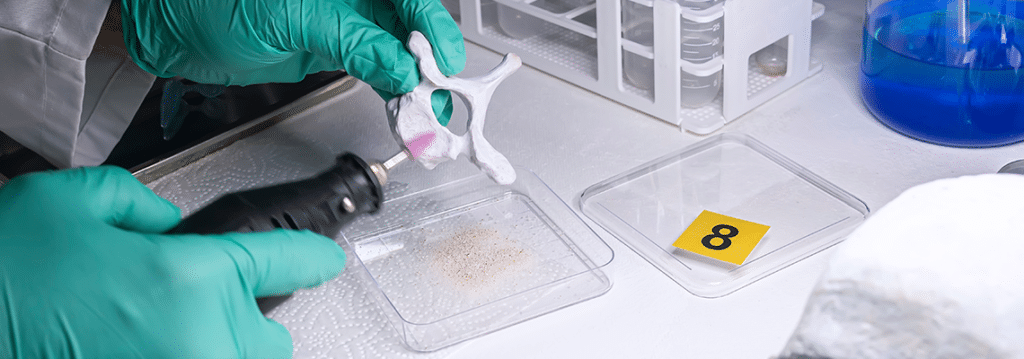AAFS 2020 PREVIEW: The Highlights of #FORENSICLIFE, new solutions, challenging samples, and more
January 21, 2020
InnoGenomics never misses a visit to the American Academy of Forensic Sciences’ Annual Scientific Meeting. The next one is coming up on February 17-22., and we’re sharing our “can’t miss” sessions in this blog post.
With InnoGenomics’ focus on forensic DNA challenges, much of the conference content below focuses on that issue. But we’ve also pulled out some globally topical content on fires, terrorism, and violence towards women, as well as some interesting explorations of the human experience of working in the forensics field.
The Human Condition (of a Forensics Pro)
- A breakfast panel on Tuesday explores “The Working Stiffs: Writing and Publishing the Experiences of a Forensic Pathologist in Both Fiction and Non-Fiction.”
- Later that day, catch a workshop on “Working Toward a Wellness Mindset for Forensic and Investigative Personnel: Addressing Stress and Trauma in the Workforce and Taking Steps to Change Agency and Professional Culture.”
New Solutions for Human Identification
- For the last decade, forensic sciences have been under the shadow of the 2009 National Academy of Sciences report “Strengthening Forensic Science in the United States: A Path Forward.” A day-long workshop on Tuesday will talk about our industry’s progress since the report’s release.
- On Monday, an all-day interdisciplinary workshop will explore “New Advances in Forensic Human Identification: Issues and Approaches.”
- In Wednesday’s Criminalistics poster session, Amanda J. Gonzalez et al. will present on Developing a Forensically Relevant Single-Cell Interpretation Strategy for Human Identification.
Fires and Other Mass Casualties
- In the recent past, the validity of fire origin determination has been called into question because ventilation-generated patterns have misled investigators. A Monday morning workshop titled “Recent Advances in Understanding Fire Pattern Production” will address this issue.
- In Friday’s Criminalistics Session 1 poster session, Wyatt Barie et al. will present on “The Evaluation of New Field and Laboratory Techniques for the Recovery of Touch DNA From Handled Improvised Explosive Devices Rendered Safe and Post-Blast.”
- And for a deeper dive into mass casualty events, see the all-day workshop Monday on “Mass Disasters and Disaster Victim Identification.”
Violence Toward Women
- On Friday afternoon, a Criminalistics section on sexual assault offers presentations on the collection and processing of evidence in the lab.
- Acts of violence against women based on their status as women demand the serious and specific attention of the international community. An all-day Tuesday workshop titled “The Murder of Women: A Global Issue That Demands Action” will look at data and policy issues around the world.
A Focus on Challenging Samples
- Wednesday’s Criminalistics session includes two highly interesting posters:
- “The ‘Secondary Burial’ in Southern Italy: How Traditional Funerary Practices Affect DNA Preservation in Forensic Human Identification” by Ciro Di Nunzio, PhD, et al.
- “A Comparison of InnoQuant® and Quantifiler® Trio as Quantification/Degradation Methods for Predicting Next Generation Sequencing” by Jessica M. McLamb
- We plan to attend the entirety of Thursday Session 1’s section on Sample Collection. Our must-see panelists are Bruce Budowle, PhD, with “Test Compatibility With Efficient DNA Collection Swabs,” and Kathleen M. Maguire et al.’s presentation on “A Comparison of DNA Profiles Recovered From Cotton Versus Nylon-Flocked Swabs From Postcoital Cervicovaginal Samples.”
- Over the lunch break, we’ll check out two Criminalistics posters:
- “A Comparison of Genotyping Success of Cotton and FLOQ™ Swabs on Casings Using Direct Polymerase Chain Reaction” by Natalia Czado et al.
- “Accelerating DNA Extractions Using a Microwave Toward Increasing the Speed and Success of Rapid DNA Analysis” by Steven B. Lee, PhD, et al.
- After lunch, we’ll be back at Session 1 for the Sample Prep & Extraction session.
- On Friday, the excellent content on challenging samples continues with the following panelists:
- Ryan Gutierrez et al.: “Mitochondrial Analysis of Challenging Samples Utilizing the ForenSeq™ mtDNA Control Region Solution on the MiSeq® FGx” (Y-STRs and Mitochondrial DNA section)
- Kadir Dastan, PhD, et al.: “DNA Extraction and Profiling From Human Bone and Tooth Samples Exposed to High Temperatures: A Comparison of Current Techniques” (Bones and Hair section)
- Emily Spack et al.: “Examining Various Methods to Extract and Amplify Degraded DNA” (Bones and Hair)
As usual, AAFS 2020 will offer a ton of valuable content to professionals seeking to improve lab processes and optimize their role in delivering justice to victims. In order to take it all in, we plan to get all our steps in at the Anaheim Convention Center.
Will you be there? Stop by Booth 320 at the Exhibitor Hall to talk with InnoGenomics’ staff. We’d love to chat about empowering your lab with tools for extracting and analyzing DNA from degraded tissue, rootless hair, and other challenging samples.
To be notified about InnoGenomics’ upcoming validation publications

